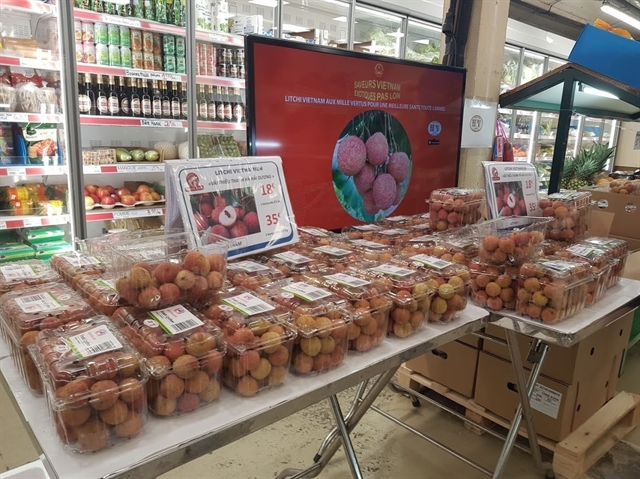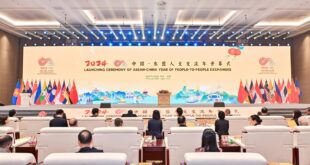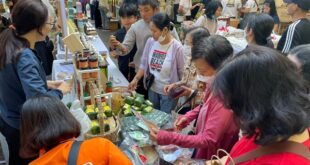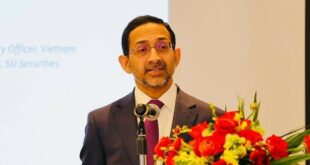
HÀ NỘI — Local agriculture officials are calling for higher contributions from overseas Vietnamese to the domestic economy.
On February 14, the Ministry of Agriculture and Rural Development (MARD) coordinated with the Ministry of Foreign Affairs (MOFA) to hold a forum connecting more than 300 overseas Vietnamese businesses, promoting trade and investment in the agricultural industry from all over the world.
According to statistics compiled by the State Committee on Overseas Vietnamese, there are more than five million overseas Vietnamese living and working in 190 countries and territories.
There have been about 3,500 projects and businesses established or contributed to by overseas Vietnamese in Việt Nam with total registered capital of up to US$11 billion, of which many are in the agricultural sector.
Director of MARD’s Department of International Cooperation, Nguyễn Đỗ Anh Tuấn said: “It is a golden time for overseas Vietnamese to connect, promote trade and invest in agriculture in Việt Nam,” adding “It is a very good chance for Việt Nam to bring agricultural products to high-end markets such as Europe, the US, and Japan thanks to the network of Vietnamese abroad.”
MARD leader Lê Minh Hoan said: “Overseas Vietnamese people are the bridge, connecting the soul of Vietnamese cultural values into products, thereby enhancing the value of Vietnamese goods.”
Minister Hoan said: “We don’t want to sell what we have, we serve what consumers want,” and in this case, he appreciated the overseas Vietnamese as “they know the taste of the importing markets.”
Mentioning the capital capacity of the overseas Vietnamese, chairman of the Vietnam International Arbitration Center, Vũ Tiến Lộc said that over the past 30 years, the total amount of remittances brought home is about US$250 billion while FDI capital was about $290 billion.
According to an official from MOFA, there were also remittances that have not been calculated and the sources could be much better, adding that the resources of Vietnamese expatriates abroad are many times higher.
Lộc said so far, the total investment capital of overseas Vietnamese in the country has not reached $2 billion, meaning there is still a huge amount of capital of people who are investing abroad but have not yet invested in the country.
Lộc said: “If we can find a way to stimulate this capital flow, combined with science and technology, management and marketing skills of the expatriate community in 130 countries around the world, it will create a huge impetus for the development of the country, not that inferior to the FDI sector.”
Deputy Minister of MOFA, Phạm Quang Hiểu confirmed the practical contributions from the overseas Vietnamese community in the field of tourism and agriculture, adding the ministry would continue working with MARD to help them reach local sources in Việt Nam.
Hiểu said it would continue to organise promotional activities and strengthen international cooperation, exchange experiences in digital transformation, e-commerce, and develop hi-tech agriculture, so that Việt Nam’s agriculture industry can continue to grow and catch up with the general trends of sustainable development and long-term adaptation to the pandemic.
At the forum overseas businesses and experts also asked for a mechanism to reduce taxes and fees suitable for businesses investing in agriculture, using air routes instead of struggling to solve the container problem during the pandemic.
Chairman of Vietnam Business Association in Germany, and chairman of Thăng Long Group, specialising in food and restaurants with 30 stores across Germany and Eastern Europe, Võ Văn Long said there were more than 220,000 Vietnamese people living in Germany.
Long said: “We should build a bridge between Vietnamese businesses and Europe through businesses in Germany, because it is a very large market. The German market is a difficult but potential market. If Vietnamese products can enter Germany, they can definitely enter other markets.”
In the context of the COVID-19 pandemic, all agricultural products in Germany had increased in price by at least 30 per cent, said Long, adding it was an opportunity for quality Vietnamese goods to enter Germany.
Hoàng Mạnh Huê, chairman of the Vietnam Business Association in Europe, said Vietnamese products should participate in the supply chains of host countries, adding that the Vietnamese community in Europe was ready to accompany domestic businesses to build Vietnamese brands in the market, thereby improving business efficiency and sustainable development.
At the forum, Lê Bá Linh, director of Pacific Foods, an enterprise with experience in bringing fish sauce to the Amazon trading floor, lychee to Europe and ST25 rice to Canada and the UK, said he wanted to make the world know that: “Vietnamese agricultural products are not inferior to any other in the world.”
Linh added to bring Vietnamese agricultural products to the world, businesses would need to know how to seize opportunities, along with that, there should be a mechanism to reduce taxes and fees for businesses investing in agriculture. Enterprises needed to create a mechanism to issue bonds to create capital and recover after the pandemic; as well as have an overall policy to support employees, including on insurance.
Linh also asked for specific support policies for exporters, including a mechanism to support communication for agricultural products and a mechanism on fees and procedures for agricultural production enterprises during the COVID-19 pandemic.
MARD’s deputy director Trần Thanh Nam considered valuable and enthusiastic contributions of expatriates would help Việt Nam’s agriculture fulfil its target and follow the motto: “Ecological agriculture – Modern countryside – Smart farmers.”
The first-ever forum of its kind also aimed to connect overseas people as an important bridge to transmit knowledge, technology and mobilise financial resources, turning Việt Nam into a powerhouse of ecological agriculture, applying scientific and technological achievements and becoming a processing and logistics centre in the global agricultural product value chain.
Việt Nam’s agriculture is gradually transforming in the direction of increasing added value and developing sustainably. The agricultural sector focuses on developing agricultural value chains, in which businesses play a central role to connect small farmers and cooperatives with global value chains.
With the efforts of the whole system, the agricultural industry continuously grows and develops comprehensively in all fields. Exports of agricultural, forestry and fishery products continuously increase from $4.2 billion in 2000 to $48.6 billion last year.
Việt Nam currently has six groups of agro products worth more than $3 billion including ten products with export turnover of more than $1 billion. — VnExpress News
- Reduce Hair Loss with PURA D’OR Gold Label Shampoo
- Castor Oil Has Made a “Huge” Difference With Hair and Brow Growth
- Excessive hair loss in men: Signs of illness that cannot be subjective
- Dịch Vụ SEO Website ở Los Angeles, CA: đưa trang web doanh nghiệp bạn lên top Google
- Nails Salon Sierra Madre
 VnExpress News The News Gateway of Vietnam
VnExpress News The News Gateway of Vietnam




